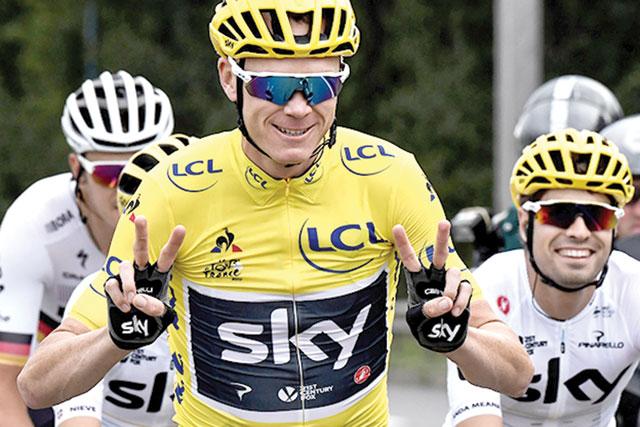You are here
Froome faces tough questions after positive Vuelta test
By Thomson Reuters Foundation - Dec 13,2017 - Last updated at Dec 17,2017

This file photo taken on July 23 shows Great Britain’s Christopher Froome (centre) wearing the overall leader’s yellow jersey flashing the victory signs during the 103km 21st and last stage of the 104th edition of the Tour de France cycling race between Montgeron and Paris Champs-Elysees (AFP photo)
LONDON — Four-time Tour de France winner Chris Froome could potentially be stripped of his Vuelta a Espana title after a urine test he gave during the race in September showed excessive levels of an asthma medication.
The 32-year-old Briton, who rides for Team Sky, says he has done nothing wrong and would provide “whatever information” world cycling’s governing UCI requires.
Froome became the first British rider to win the Vuelta and the first man to claim a Tour de France/Vuelta double in the same season since the Spanish race was moved to after the Tour.
Regarded as one of the greatest cyclists of all time, Froome has been on a shortlist of favourites to win this month’s BBC Sports Personality of the Year award for the first time.
His spectacular year is now under a cloud, however, and he and his Sky team will need to convince the UCI that there was nothing sinister about the amount of Salbutamol that showed up in his urine sample after Stage 18 of the Vuelta on September 7.
Salbutamol is permitted as a legal asthma drug by the World Anti-Doping Agency (WADA), and the UCI said Froome’s failed urine test did not necessitate a mandatory provisional suspension.
But riders have been banned for excessive use of it in the past, notably Italian Alessandro Petacchi who was given a 12-month suspension and stripped of his five stage victories in the 2007 Giro d’Italia.
The UCI said in a statement it had notified Froome on September 20 of an “Adverse Analytical Finding” from his sample, which had double the permissible limit of Salbutamol.
‘Greatest care’
Team Sky issued a statement in which Froome said he had followed medical advice and taken an increased dosage after his asthma, a lifelong condition, became worse.
“As always, I took the greatest care to ensure that I did not use more than the permissible dose,” Froome said.
“I take my leadership position in my sport very seriously. The UCI is absolutely right to examine test results and, together with the team, I will provide whatever information it requires.”
The Kenyan-born rider also took to Twitter, thanking those who had sent messages of support and saying he was confident “we will get to the bottom of this”.
Vuelta organisers said they were awaiting official conclusions from the UCI and hoped for a swift conclusion.
“The regulatory entity has launched an investigation and the position of La Vuelta’s organiser is one of extreme caution,” they added in a statement.
Earlier this year Froome, who prides himself on racing clean, said he had refused a therapeutic use exemption (TUE) to treat his asthma on the way to winning the 2015 Tour de France.
The UCI said analysis of the rider’s B sample from the Vuelta test confirmed the results of the A sample and proceedings were being conducted in line with its anti-doping rules.
In Petacchi’s case, the Court of Arbitration for Sport found the Italian rider had not intended to cheat but had not exercised “utmost caution” in the use of his asthma treatment.
Complex issues
Limited levels of Salbutamol are permitted by WADA rules without the need for a TUE.
Sky said analysis of Froome’s sample showed a concentration of 2,000 nanograms per millilitre (ng/ml), compared with the WADA threshold of 1,000ng/ml.
Team Sky said there were a range of “complex medical and physiological issues” that could have led to the result.
“I have the utmost confidence that Chris followed the medical guidance in managing his asthma symptoms, staying within the permissible dose for Salbutamol,” said Sky team principal Dave Brailsford.
“Of course, we will do whatever we can to help address these questions.”
The revelation comes at the end of a year in which Team Sky have been dogged by allegations of “wrongdoing” over its use of TUE’s and its medical record keeping after the “jiffybag” controversy at the Criterium du Dauphine race in 2011.
An investigation by UK Anti-Doping concluded recently, saying it had been unable to prove what was in the package sent to former rider and 2012 Tour de France winner Bradley Wiggins.
Related Articles
On the first rest day of the Tour de France, Team Sky boss Dave Brailsford wondered why Vincenzo Nibali was being let off the hook over cycling’s doping problem after last year’s champion Chris Froome was grilled multiple times on the matter.
L’ALPE D’HUEZ, France — Geraint Thomas became the first man to win up l’Alpe d’Huez with the yellow jersey on his shoulders on Thursday, as
AMMAN — HRH Prince Feisal on Wednesday met with President of World Anti-Doping Agency (WADA) Witold Banka, commending the agency's efforts t

















